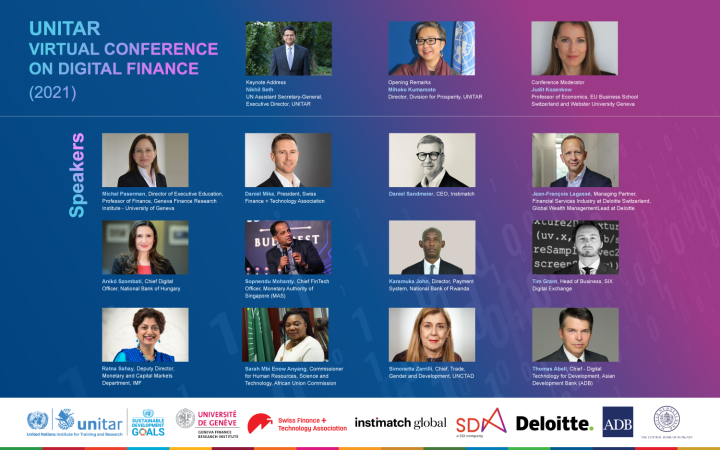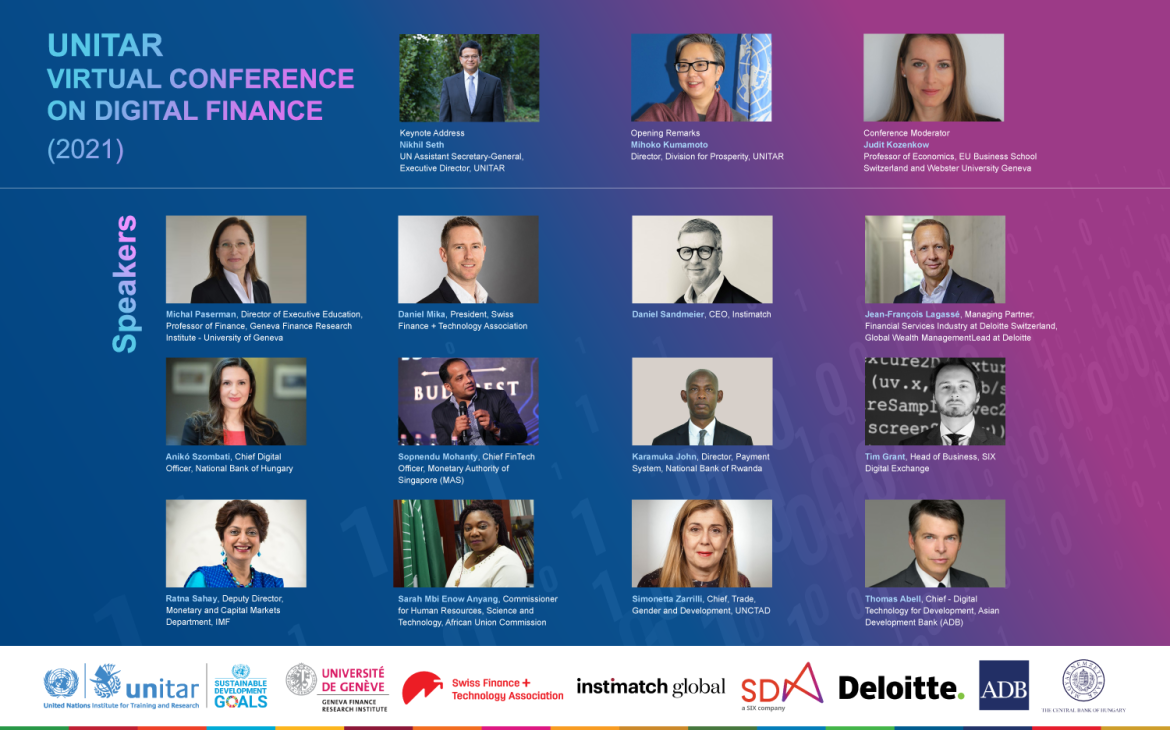11 May 2021, Geneva, Switzerland - World Creativity and Innovation Day (April 21) was the perfect timing for the United Nations Institute for Training and Research (UNITAR) to launch its new Digital Finance Initiative with a virtual conference. The Initiative aims at supporting countries and organizations to harness digital technologies and to develop the essential digital and financial knowledge and skills of their people.
The conference generated forward-looking and future-oriented discussions on the future of finance in the context of the latest FinTech innovations, best practices of digitalizing monetary policy and currencies from the regulatory perspective, and the potential of digital innovations in accelerating sustainable development. UNITAR partnered with such distinguished entities for this event as the Asian Development Bank, Deloitte Switzerland, Geneva Finance Research Institute of the University of Geneva, Instimatch Global, National Bank of Hungary, SIX Digital Exchange and Swiss Finance and Technology Association.
Mihoko Kumamoto, Director of the Division for Prosperity at UNITAR in her opening remarks expressed that the COIVD-19 pandemic has severely impacted not only our health systems, but also our economies and societies, while digital transformation accelerated. Therefore, the Division for Prosperity aims at contributing to “building back better” – during and after the pandemic. She highlighted that the new Digital Finance Initiative has been created to support this purpose and it includes a portfolio of online and offline courses, facilitation services for digitalization in the public sector, and an annual conference with leading FinTech innovators, government and central bank representatives, financial regulators, development experts and the academia.
The keynote address of Nikhil Seth, UN Assistant Secretary-General and Executive Director of UNITAR, highlighted the global megatrends, among them the digital revolution with its transformative and innovative power for all of us. He reminded of the considerable digital risks, such as increased exclusion, discrimination and deepening inequalities. The global pandemic has slowed down development and has created numerous social and economic challenges. New digital connection platforms and constant virtual environment, including online learning could play a key role to overcome them. UNITAR’s mission is to develop the individual, institutional and organizational capacities of countries and other United Nations stakeholders through high-quality learning solutions, training, education and other facilitation services to support country-level action.
The conference featured distinguished speakers and interactive dialogues moderated by Judit Kozenkow, Professor of Economics at EU Business School Switzerland, and Webster University Geneva.
The first panel addressed the theme, “The Future of Finance with New FinTech Innovations”. Michal Paserman, Professor of Finance at University of Geneva discussed major trends in FinTech and the evolution towards a more decentralized finance (DeFi). The removal of intermediaries between parties in a financial transaction creates greater transparency and streamlines the process for the consumer, therefore it gives power to the individual. She emphasized the need to further develop and enhance FinTech to continue engaging younger generations, as they will become the driving force in consumer spending over the coming decade. She reminded of the risks involved with financial innovation and deregulation, more importantly with the increasing bubble that could lead to another financial crisis. Jean-François Lagassé, Managing Partner at Deloitte Switzerland covered global trends and future perspectives in the financial services sector. He highlighted three among eleven clusters of innovation exerting pressure on traditional business models. The future of financial services is here, and traditional players are being constantly challenged in all parts of their value chain by new FinTech innovations. There is enormous value provided by FinTech innovations: emerging payment rails, the democratization of wealth management, and advancing technologies in the insurance sector increase financial inclusion and consumer empowerment. Daniel Mika, President of Swiss Finance & Technology Association, discussed his foundation’s work in “representing stakeholders’ neutrality as a center of gravity, fostering the development of the Swiss FinTech ecosystem.” He underscored the importance of sharing knowledge and gaining insights from experts in FinTech and innovation, bringing a focus on education as a key tool to manage disruption at a time of accelerated transformation. Daniel Sandmeier, CEO of Instimatch Global, stressed some of the issues we are facing in digital finance including the lack of technology in money markets in terms of execution, consequently resulting in lack of transparency, and the lack of counterparty diversification. By building a strong infrastructure for a fast, secure, and user-friendly trading network, Instimatch bridges the gap with higher levels of trust, security and speed. COVID-19 accelerated digitalization of payments and there is a collective responsibility that is expected from a scalable network of financial services to safeguard consumer data and personal information.
The panel concluded that the future of finance is highly driven by the emergence of new FinTech innovations that disrupted traditional financial services. Finance and technology have never been as synchronized as they are today. There is a major shift in power from traditional financial institutions to consumers. The FinTech revolution expedites this process, and holds the potential to improve financial inclusion.
The second panel focused on the theme, “The Digitalization of Monetary Policy and Currencies”. Anikó Szombati, Chief Digital Officer of the National Bank of Hungary (MNB) emphasized innovation as the key element in the evolution of FinTech since the 1860s. The ramifications led to FinTech disruptions as to where banking and capital markets were forced to integrate technologies in their ecosystem to facilitate innovation. Central banks were slow to adapt, however, there was a growing demand from consumers in terms of transparency and accessibility. One of the potential forward-looking strategies is “finding a balance to facilitate innovation while reducing risks” through regulation. Innovation and business-led transformation is not only critical to sustainable growth but also in gaining the trust that traditional institutions have lost. Sopnendu Mohanty, Chief Fintech Officer of the Monetary Authority of Singapore (MAS) provided a fresh perspective on the FinTech disruption through the Asian lens. He highlighted that Singapore has become one of the top global FinTech hubs with a key element of encouraging incumbent financial institutions to internalize the transformation and “philosophical cultural shift” that have been happening in Asia. He underlined the essential role of policymaking. A strong and cohesive regulatory approach supports innovation and optimizes public infrastructure to deliver sustainable returns. John Karamuka, Head of Payment System at the National Bank of Rwanda explained how FinTech innovations have caused a major cultural shift in Sub-Saharan Africa and launched different initiatives. Despite the remarkable developments, there are challenges to overcome in order to streamline processes in the financial sector, increase financial literacy and inclusion. Financial inclusion should be a collective initiative from both supply and demand sides, along with building a resilient infrastructure and a supporting regulatory framework to overcome the challenges. Tim Grant, Head of Business at SIX Digital Exchange emphasized the practical application of digital assets and the necessary underlying infrastructure. He mentioned that FinTech has become an integral part of financial globalization and companies must position themselves to take an active role in defining the future of finance. Key strategies should be adopted in the 21st century, as we are well into the Fourth Industrial Revolution. To engage with financial services in a new way, we must adopt to new kinds of marketplaces with a global mindset and broader jurisdiction, “We can’t be slaves to traditional methods”.
The following discussion raised the issues of financial inclusion, infrastructure development, regulatory policies for digital currencies and the need to have a universal approach to overcome challenges in a digital economy. The panelists reiterated the importance of building a trusted identification system and a digital infrastructure. By doing so, we create a global, seamless experience for the consumer based on transparency. We must learn to leverage the type and volume of data available and to approach these challenges with a visionary mindset to provide stability, clarity, inclusion and direction to navigate the Digital Finance environment.
The third panel explored the theme, “Digital Innovations for Sustainable Development”. Ratna Sahay, Deputy Director of Monetary and Capital Markets Department at the International Monetary Fund (IMF) provided a macroeconomic perspective on financial inclusion and FinTech. She shared the IMF’s findings based on cross-country studies that a country with high percentage of financial inclusion has higher economic growth and lower inequality. “If countries are more inclusive in terms of democratization of financial services, the inequality falls much more.” Financial inclusion is therefore a key enabler into achieving the Sustainable Developmental Goals. Sarah Mbi Enow Anyang Commissioner for Human Resources, Science and Technology at the African Union Commission, underscoring the challenges in the African Union, emphasized the need of a digital transformation strategy to “handle digital technologies and innovation to transform African societies and economies.” There is an urgent need to integrate innovation and digital financing into Africa’s economy to achieve the goals of Agenda 2063 and transform Africa into a global powerhouse of the future. “An economy in Africa that improves the quality of life of African citizens strengthens the existing economic structure.” We must secure inclusivity and leave no one behind. Simonetta Zarrilli, Chief of Trade, Gender and Development Programme at UNCTAD shared the situation of Sub-Saharan African small-scale cross border traders, most of them are women, and detailed the financial inequalities these women traders experience thus hindering their economic empowerment opportunities. Their financial obstacles include limited lending power, financial literacy, and the inadequate number of resources for digital mobility. She underlined the importance of mobile payments and how it is a means to address the financial obstacles women cross-border traders face. Thomas Abell, Chief of Digital Technology for Development at the Asian Development Bank (ADB) shared a range of ADB provided financial vehicles: grants, lending, technical assistance, and infrastructure development for treasury departments and central banks. The most recent among these tools are a FinTech policy toolkit to “support financial innovations especially in areas where trials and pilots need to be done”. He stressed that digital finance is a foundational infrastructure for a digital economy and governments play an integral role in harnessing this global opportunity and promoting inclusive growth.
A quote from Nelson Mandela was shared by Sarah Anyang that concluded and summarized the conference extremely well: “Education is the most powerful weapon which you can use to change the world”. The relationship between financial stability, financial inclusion and financial literacy are mutually reinforcing. Digital Finance is a catalyst for economic development as we move towards a digitalized world and it can be used as a tool to help inspire and mobilize actions around the world in order to achieve the SDGs. UNITAR’s Digital Finance Initiative promotes harnessing digital financial technological innovations and scaling financial inclusion to build inclusive and sustainable future for all.
Conference Recording
Full recording of the Digital Finance Initiative virtual conference 2021, please visit www.unitar.org/DF2021
For partnership inquiries, please email michael.adalla[at]unitar.org
Upcoming online courses on Digital Finance
Systemic Trends in Cross-Border Trade and Finance: Opportunities and Risks of the Digitalisation Challenge (Course Date: August 30 to October 1, 2021)
Online registration: https://www.unitar.org/event/full-catalog/systemic-trends-cross-border-trade-and-finance-opportunities-and-risks-digitalisation
FinTech: Financial Innovation, Transformation and Opportunities in the Digital Age (Course Date: September 13 to October 22, 2021)
Online registration: https://www.unitar.org/event/full-catalog/fintech-financial-innovation-transformation-and-opportunities-digital-age
Understanding Financial Crime Threat in Digital Financial Services (Course Date: September 20 to October 22, 2021)
Online registration: https://www.unitar.org/event/full-catalog/understanding-financial-crime-threat-digital-financial-services
Economics of FinTech: Foundations, Applications & Impact (Course Date: October 11 to November 19, 2021)
Online registration: https://www.unitar.org/event/full-catalog/economics-fintech-foundations-applications-impact
Harnessing Digital Innovations for Sustainable Development (Course Date: October 25 to November 26, 2021)
Online registration: https://www.unitar.org/event/full-catalog/harnessing-digital-financial-innovations-sustainable-development
UNITAR's Division for Prosperity thanks and acknowledges the support provided by Dr. Judit Kozenkow and Hannah Grace Ngorombaba in launching the UNITAR Digital Finance Initiative.



